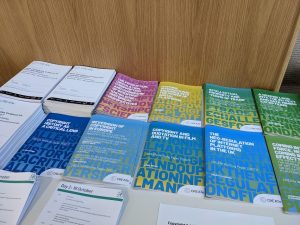
A few weeks ago I went to the University of Glasgow to a 2 day conference organised by CREATe who are the UK Copyright and Creative Economy Centre. I was invited to attend the Copyright Evidence Conference and contribute to the event based on my expertise related to copyright and online learning. CREATe are an interdisciplinary research centre established 10 years ago and in that time they have produced a wealth of research papers, run projects and events and supported doctoral students. They describe themselves as:
…the only UK research centre funded jointly by AHRC (Arts and Humanities Research Council), EPSRC (Engineering and Physical Sciences Research Council) and ESRC (Economic and Social Research Council), we conceived and delivered an interdisciplinary research programme at the intersection of law, technology, social sciences and humanities.
I’ve long been impressed by their work, but the conference they organised was really innovative both in its topic and the way in which it was designed. It was held in the Advanced Research Centre (ARC) which is a brand new building on the Glasgow campus, designed to foster interdisciplinary research. They have some great facilities to support hybrid events, and the Chair of the day, Professor Martin Kretschmer sadly tested positive for covid the day before the event, so had to join us online. However, the facilities meant he was able to participate in the event, joining us on the screen via Zoom. Several other delegates and speakers also attended online and the microphones around the room helped ensure people were able to interact with those online and in person.
I won’t focus so much on the contents of the conference, as Chris Morrison from the Bodleian Libraries has written a detailed report on the Oxford Open Scholarship blog. However, I was really impressed with the structure of the conference. It was all about “myth-busting” and looking at what the evidence, in the form of published research, tells us about how copyright currently works and how it should be reformed.
CREATe have been accumulating what they call their Copyright Evidence Wiki, where all the empirical evidence published on different aspects of copyright is listed – there are over 860 studies on the wiki. Only empirical research is included, and it must focus on an aspect of copyright. You can view the wiki and search or access it by category. This is a really innovative way of pulling together the published outputs on a topic, rather like a systematic review.
The format of the conference was to make five propositions about the future of copyright, and then convene a panel of experts on each topic. The experts used the evidence from the wiki, to summarise what the evidence tells us about how to reform copyright. The topics that were considered over the two days included:
- Copyright ensures that creators get fairly paid and recognised
- Stronger and longer copyright protection increases creative and scholarly output
- Copyright enforcement measures are effective in regulating infringing behaviours
- Copyright works similarly in all creative industries
- Users’ interests are accounted for within the copyright regime
In each case the evidence from the wiki was mined to help answer these questions. It was a fascinating day and in fact in all cases the evidence suggested that each proposition doesn’t stand up to scrutiny. I recommend reading Chris’s report for further details but proposition one and two were really interesting to me. I was also intrigued and asked the panelists for proposition three (that copyright enforcement measures are effective in regulating behaviours) whether the evidence suggests copyright education is effective. Interestingly they were not sure and the conclusion was more research is needed!
Another highlight of the conference was an evening lecture by sci-writer and internet activist Cory Doctorow and Professor Rebecca Giblin on their new book ‘Chokepoint Capitalism‘. It looks at how many of the creative industries are now dominated by mega corporations who effectively operate as monopolies. Their book has chapters that look at different creative industries including book publishing and news, live music and music streaming, screenwriting, radio and more. As they say in the publicity for the book:
From Amazon’s use of digital rights management and bundling to radically change the economics of book publishing, to Google and Facebook’s siphoning away of ad revenues from news media, and the Big Three record labels’ use of inordinately long contracts to up their own margins at the cost of artists, chokepoints are everywhere.
